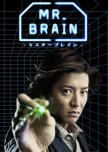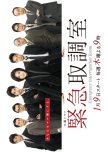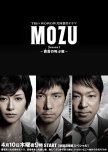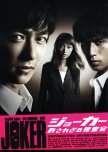
There is a lot to love in Keiji Yugami. The direction, the pacing, and the cinematography are of high quality worthy of the high budget production. Expect stylish shots and ultra-modern Tokyo with classy color-grading. The first episode, in particular, beautifully captures the unique world of Japanese subway.
The cases are fresh and not too obvious even if the viewer may occasionally doubt the easiness with which suspects confess. Most importantly, there are lots of female characters and they are rarely victims. This alone adds a lot of variety to the show. The main plot line is not impressive, though, but passable. After all, there is only so many ways a buddy cop show can end.
The main attraction of the show is undoubtedly the detective duo. Played by the two veteran actors Asano Tadanobu and Kamiki Ryunosuke (who gets his veteran title for debuting in the industry when he was two years old), the main characters have great chemistry together. The roles of greedy hypocritical 'upstanding' guys is Kamiki's forte and he doesn't get overshadowed by Asano's charisma and natural acting.
While this drama is not outstanding the way Unnatural or Dele were, it is still damn good and one would be hard-pressed to find a buddy cop J-drama of equal quality.
Cet avis était-il utile?

This drama undoubtedly boasts stellar cast. Kimura Takuya and Ayase Haruka need no introduction. Kagawa Teruyuki and Mizushima Hiro play support roles while Koyuki, Gackt, Kamenashi Kazuya, and Nakama Yukie are among the guest stars. It's like they gathered together all of the actors who had played main roles in the dramas hugely popular at the time. They even casted Sato Takeru who could not act to save his life then but who is getting the best actor nominations at the academy awards now.
Thus, this drama was destined to become popular. The detective drama of the same magnitude in 2020 would cast Sato Takeru as the detective, Arimura Kasumi as his plucky side-kick, and Aragaki Yui, Suda Masaki, Yamazaki Kento, Toda Erica etc. as guest stars. Of course people would tune in. To this day, those who love classic J-dramas remember Mr. Brain fondly.
However, all of the other qualities of this drama are suspect. The setting is not just over-the-top, it's downright bizarre. J-dramas often employ exaggerated emotional reactions as comic relief that gently gives way to a touching profound message underneath. Here, though, the hyperbole goes too far turning the story into a literal fairy-tale. And fairy-tale that throws around real scientific facts is very bizarre thing indeed.
All of the characters are two-dimensional and only great charisma of their actors saves some of them. Kimutaku and Ayase Haruka played many iconic roles but their characters here never quite manage to become those sympathetic leads the viewer roots for. Whether it's due to Ayase Haruka's character being too dumb (I feel really bad writing this) or to Kimutaku's character being too arrogant is hard to say.
The cases are done in the style of classic British detective where incongruous puzzle is more important than realism (think Agatha Christie or Detective Conan). To the dramas' credit, the cases are coherent and fast-paced if over-the-top to the n-th degree.
What really drives me nuts, personally, is the way the story uses real scientific facts. For example, it's true that some types of brain trauma can cause the person to acquire a super-human ability. But it doesn't mean that this person will be exactly the same as before only with additional ability. I wouldn't call treatment of various psychological conditions in this drama offensive but it does make one want to roll their eyes a lot.
How much weird silliness can you tolerate for the sake of your favourite actors playing not that interesting characters? That's a question to ask yourself if you are wondering whether to watch this drama.
Cet avis était-il utile?

It's easier to say who among Japanese top actors didn't act in Gintama than who did. Oguri Shun is a definitive action leading man so his casting as Gintoki is understandable the same way it's obvious why Nagasawa Masami played Shimura Tae. Addition of hugely popular Hashimoto Kanna as Kagura could just be an indication of a big budget. But nothing explains why art-house heavy-weight and Japanese public darling Suda Masaki plays Shinpachi. Nothing!
As if one film festivals awardee is not enough, Yagira Yuuya is also there. Other characters are either played by drop-dead gorgeous actors like Okada Masaki, Yoshizawa Ryo (both of whom are unbelievably handsome throughout the whole movie), and Nanao (who famously said that she wouldn't date "a Shinpachi" after the rumours of her dating Suda Masaki surfaced), comedy veterans like Sato Jiro, or older audience favourites like Yasuda Ken.
Obviously, the evil mastermind of the movie had to be played by none other than KinKi Kids' Domoto Tsuyoshi.
The movie narrowly avoided casting Sato Takeru, Kamiki, and Fujiwara Tatsuya (presumably so as not to throw shade on Ruroken franshise). Also, for some reason, Ayano Go is missing but his friend and titan of Japanese acting Yamada Takayuki is there albeit in a tiny voice-over cameo.
The only movies enjoying such a cast are usually serious blockbusters by famous directors like Ruroken or Kingdom. How come such a cast could be gathered to act in a vulgar relatively low-budget samurai comedy? The Japanese public couldn't fathom this either so it kept going to watch the movie and eventually made it a huge box-office hit.
The brilliant actors add charisma, relatability, and depth to the 2-dimensional characters they are playing even if they have just a couple of scenes. Nagasawa Masami and Oguri Shun even manage to create real chemistry in the scant 3 minutes of screen-time they share. Suda Masaki, Hashimoto Kanna, and Yoshizawa Ryo, in particular, show some real emotion. Oguri Shun perfectly conveys quiet sadness of a person who had lost everything including his own identity.
I'd dare say, the depiction of this sadness and nostalgia so typical of the titular shounen manga is one of the strongest points of the story. A true shounen spirit is always a pleasure to observe. The relationship between Gintoki, Kagura, and Shinpachi as well as camaraderie between other characters is suitably heart-warming.
The comedic timing of the brilliant cast is spot-on. Okada Masaki is particularly delightful as a hapless rebellious samurai.
The only two actors who don't quite put their weight are Yagira Yuuya and Domoto Tsuyoshi. They seem miscast a bit.
The story itself is full of gags of varying quality (including pop-culture allusions). The viewer must survive the gross opening sequence (that features beetle hunting and some very questionable humour) to enjoy the rest of the story which is quite watchable. Admittedly, the action is not up to, say, Ruroken standards but it's ok. I'd say, that the manga is actually less vulgar and more heart-warming but what can you do.
If you enjoyed this movie, don't skip Gintama 2 - in some aspects it's even better.
Cet avis était-il utile?

ST Keishichou Kagaku Tokusou-han
1 personnes ont trouvé cette critique utile
First and foremost, ST should not be taken seriously. This is not so obvious from the first half of the movie. After all, a lot of diagnoses fly around and we haven't yet seen enough to decide if Fujiwara Tatsuya' character have a real agorophobia or a Hollywood one. Eccentric scientist haven't yet revealed the extent of their 'fake science' knowledge and the plot seems coherent.
Then the pile of small details like the obviously fake wig of Shida Mirai or the way expertise in chemistry gives one super smell becomes too hard to ignore, and as the movie comes to its close the viewer is left with no doubts that ST is actually a trashy mystery movie.
That knowledge, though, is not in conflict with another truth: ST is very fun. Okada Masaki who is arguably the most handsome actor of his generation, plays a hapless inspector who tries to convince unreasonable forensic experts to help him solve the case using the sole method of looking at them with his puppy eyes.
His puppy eyes game, though, is so strong it works on the most unreasonable of the bunch - the expert played by Fujiwara Tatsuya. It's hard to find someone more suitable to play powerful but anxious detective with sinister aura than Fujiwara. He suffuses his character with much needed vulnerability and cuteness. Together with Okada Masaki, they are perfect as unlikely detective duo.
Kubota Masataka adds considerable charisma to his character who doesn't even have lines and shows off his action skills. Kubota's road to blockbuster action movies was long but the destination well deserved.
Finally, Hayashi Kento plays the big bad boss who always wants to fire or reassign everyone. He looks like middle-schooler (or a fed-up chihuahua) but he is too well of an actor not to put his all in the role.
All of this combined with fast-paced if outrageous plot makes for a fun watch.
Cet avis était-il utile?

Kinkyu Torishirabeshitsu
1 personnes ont trouvé cette critique utile
This drama is almost unparalleled in Japan. So popular it went on for three seasons, it boasts the brilliant script, the high quality production, and the acclaimed guest stars for each episode. It wouldn't be a big stretch to say that so much effort is rarely put in procedurals. Most importantly, the real human emotions run high every episode giving the show a dramatic edge and universal appeal more genre works usually lack. Great tension, pacing, and consistently witty dialogues keep the viewer engaged.
At the centre of the drama, though, is Amami Yuki. She perfected her presence and charisma during her time as a Takarazuka performer, and she is simply majestic here as the strong female character J-dramas deserve. Her chemistry with other interrogators played by the veteran actors is through the roof.
There are two reasons why this drama in not on top of the Mydramalist Rating.
Firstly, there are no ikemen in the main cast. Admittedly, it's a stupid reason but rare comic relief scenes with Hayami Mokomichi do not an idol drama make (and heart wants what it wants). I'd recommend you to give it a chance nonetheless as the cast is unbelievably entertaining.
The second reason is the case-of-the-week structure of the show. A lot of action happens inside confines of an interrogation room so there is no space for elaborate overcomplicated sensationalistic cases. The final arc of the show has appropriate sinister foreshadowing but would hardly shock anyone.
All in all, it's a brilliant Japanese production with the second season being even better than the first.
Cet avis était-il utile?

Border consistently ranks at the top of 'the best detective J-dramas' ratings, yet, it is often claimed to be boring and unoriginal. This discrepancy is easily explained.
On the one hand, the Border scriptwriter Kaneshiro Kazuki is known for his solid well though out mystery plots. In the small world of detective J-dramas solid plot is nothing to sneeze at.
The main character is also quite unusual for a procedural; he is young run-of-the-mill policeman who is disillusioned with the mission of the force, the higher ups, and himself. He is decidedly not a hero. His newfound ability finally gives him an edge in the fight against injustice but it also inconveniences him and makes him an outcast. In other words, for those inclined, the many small misfortunes of the main character are a great source of dark amusement especially since Oguri Shun infuses the character with his trademark charm.
The bleak atmosphere and hypnotic pace underline the existential despair of the main character so the viewer never stops wondering where is the limit of the main character's power and what happens when it is reached. After all, we all know that there is only so many ways a detective drama can end.
It is also worth noting that the drama is a serious one despite the 'seeing the dead' aspect. That differentiates it quite a lot from western fluffy shows with gimmics.
On the other hand, bleak atmosphere and hypnotic pace for those who don't enjoy these things easily translates to boring storytelling and navel-gazing. The secondary characters are not that fun and some of them are further bogged down by mediocre performances. There is no romantic tension or engaging banter (aside from scenes with Furuta Arata's character). The main character's rage against injustice is too easily seen as a typical seinen riot against unfair world that doesn't give one what they feel entitled to.
Unlike Unnatural, Dele or Keiji Yugami, Border is not a mystery drama for everyone. But it is quite different from many other J-dramas and it is the closest to the true noir (the unsexy kind) you can find. I'd especially recommend it to the detective lovers who got tired with 'closed room' Agatha Christie shenanigans in J-dramas and who can tolerate the lack of fanservice for the sake of dry plot developments.
Cet avis était-il utile?

Confession of Murder
1 personnes ont trouvé cette critique utile
Whether one considers Fujiwara Tatsuya a king of overacting or an acting titan, one must admit that he is recognised inside the industry as a definitive performer of the villain roles. After all, he meets all the requirements: his presence always looms large despite his small stature and his low voice is perfect both for enticing others to the dark side and for instilling fear in the hearts of his enemies. Violet prose aside, it takes little effort to imagine Fujiwara petting a white persian cat while torturing the most recent Bond incarnation.
The villain of this movie, in particular, seems to be tailored for Fujiwara. The character is handsome, smug, intelligent, and violent. The viewer is ready to cheer his downfall yet can't help but wonder if something else is going on with this murderer.
Other characters including the male lead played by Ito Hideaki are similarly charismatic. Moreover, the Korean origins of the material lend unexpected passion to the characters and tension to the conflicts. Japan is a country with a very low crime rate so the idea that upon learning that law enforcement failed to capture the criminal (which is already outrageous) the victims' relatives will take justice in their own hands is quite bizarre. So it's rarely encountered in J-dramas. In this movie, not only the themes of revenge, corruption, and helplessness are touched upon, the characters act in a more dramatic manner than the expected norm.
This passion makes for entertaining confrontations. I'd argue they are the main attraction of the movie. Indeed, while the plot is suitably unpredictable (and has several nice touches for mystery connoisseurs), it is not ground-breaking. Moreover, the story is a bit dated and has the expected dose of sexism and heavy-handed moralizations.
While Fujiwara did receive the best actor nomination at the Japanese Academy Awards for his role in this movie, the movie itself is best enjoyed not as a serious drama but as a classic dark mystery that features charismatic characters thrown into passionate conflicts and nice sleek cinematography. The scene of the final confrontation, in particular, seems to be heavy on the fanservice.
Cet avis était-il utile?

MOZU Season 1 - Mozu no Sakebu Yoru
1 personnes ont trouvé cette critique utile
The production budget of this show is of almost obscene levels. There is no single clandestine meeting that doesn't occur on the skyscraper rooftop that offers a magnificent (and nicely color-graded) view of the night time Tokyo. If all of the rooftops are otherwise occupied the characters opt for car parks full of gleaming sports cars or 'dirty' alley ways that have never looked so upscale before.
Those who were expecting Mozu to be serious drama might start to suspect that something is a bit off once they are hit with a full force of blockbuster grade production values. Indeed, Mozu seems like a serious political thriller with a devastating human tragedy at its core but this impression is most certainly wrong.
Mozu, first and foremost, is a hard-boiled spy thriller. The action, the atmosphere, the charismatic heroes, and the sensational reveals are the main attractions of this show.
The over complicated plot is actually a red-herring. The viewer has no chance to untangle most of the mysteries because that is not the point. After all, we all know that Soviet spies, I mean, North Korean spies are behind everything anyway. We are just not sure exactly how but that's why second seasons exist.
Once you realize that the show is not supposed to be taken too seriously, there is no end to entertainment on offer.
Firstly, while everything is stylish as it should be in a good noir, the characters are what's really in style. They are all charismatic and have great chemistry with each other. One needs exactly 5 minutes to understand why Nishijima Hidetoshi who plays the protagonist is considered a sex-symbol in Japan. His image of dependable stoic man goes right in hand with his character, a detective driven to the brink by the corrupt world he lives in. Low voice, black suite, and cool one-liners are the nice finishing touches to the portrayal of the character you wouldn't mind rooting for as he fights Russian spies and Takeshi Kitano alike (in the sequels, obviously).
Other characters are charismatic in their own way. The show that casts Yoshido Kotaro as a petty villain most certainly does not pull its punches. Ikematsu Sosuke, in particular, shows off his great range.
Another great fun of the show is plot reveals and suspense. The viewers are kept on the edge of their seat almost every episode with the litany of "they can't imply that, right? There is no way!" on their lips. While the overall plot is hopelessly tangled, some points of it are accessible and make for a lot of entertainment while the viewer tries to guess the "ultimate truth".
Cet avis était-il utile?

Joker Yurusarezaru Sousakan
0 personnes ont trouvé cette critique utile
The viewers who grew up watching American procedurals may not realise how much effort it actually takes to make a decent detective drama. Charismatic cast with great chemistry, cases that must be entertaining and coherent despite the time and budget constraints, tense central arc with dramatic finale and sinister foreshadowing are all the ingredients of a great case-of-the-week detective show and they are not that easy to come by. The right balance between the gritty realism and the thrilling adventure must also be maintained.
It is no wonder then that there aren't that many great case-of-the-week detective J-dramas. The most popular ones are mostly comedies or deal with 'closed room' Agatha Christie style mysteries where an improbable puzzle is more important than realism or emotional believability. That makes Joker all the more important as the rare classic procedural. It has all of the necessary ingredients and, I'd say, a charming uniquely Japanese idealism.
The suspense, the amazing main musical theme, and the really endearing main character are the strongest points in my opinion.
The viewers need to beware the really small budget production and the classic structure (it is no Sherlock, obviously). I'd also not recommend this to the fans of Nishikido Ryo as there are several shows where he has more interesting roles.
Cet avis était-il utile?

My Roommate is a Detective
3 personnes ont trouvé cette critique utile
"My Roommate is a Detective" is a Chinese detective comedy done right. It has all of the ingredients: funny charming (and hot) characters who always look sharp in their impeccable period get-ups, genuinely funny slapstick humour, engaging banter, and fresh cases (especially for those unaccustomed to Republican era dramas). Most importantly, the story is very consistent and fast-paced so occasional silliness of the cases is easy to forgive.
The titular roommate-detective Lu Yao is particularly delightful as the story never lets him get out of any situation with his dignity intact. One moment he's a genius Sherlock Holmes wannabe / arrogant Oxford alumni and the next he shamelessly stuffs his face with free food, gets his thin lies (and pickpocketing habit) exposed, and runs away at the slightest sign of danger.
Inspector Qiao, on the other hand, is a stern no-nonsense official who can bark orders like any other quasi-military personnel but who is actually very patient and easy-going. His street-smarts allow him to spot and hire Lu Yao while his patience allows him to tolerate the genius detective's antics. Inspector Qiao's perpetual dry amusement and air of contentedness is a a balm for the viewer's soul.
It goes without saying that both characters are played by gorgeous actors.
The female lead Ms. Bai does grate on one's nerves at the beginning of the drama. She gets away with some really outrageous actions and her struggles are hard to sympathise with. I wouldn't agree with those who say she isn't necessary for the plot because she does provide case details and occasional funny banter. Moreover, her scenes become less and less eye-roll worthy as the show progresses.
The cases themselves are a bit on a sillier side but quite inventive. They lean more towards Conan Doyle than Agatha Christie with the focus on forensic analysis and gathering of the clues. None of that 'let's all meet at the ballroom in our evening best to dramatically reveal who is the murderer among us' stuff. On the other hand, the time period means that police brutality, nepotism, and dealings with mafia are the norm.
Moreover, C-dramas ostensibly can't portray good people being killed so every other victim turns out to be a person who has committed severe crimes. That makes culprits more sympathetic than the victims which is a weird dynamic for a lighthearted show where the viewer is supposed to root for the detectives.
Some problematic stuff appears here and there, not to mention that Inspector Qiao is a gangster but a honourable one?? The viewers aren't supposed to take any of that seriously but some cases really push their luck.
The opening and ending music themes are really nice.
All of the above concerns the first 12 episodes of the show. The 13th episode makes it clear that there will be no meaningful character development or dramatic story-line in the rest of the show. The heroes begin to act out of character and the focus of the story shifts to romance and family drama. This makes it harder to tolerate the silliness of the cases with their at times truly atrocious resolutions. The super-obvious fanservice and in-your-face romantic scenes are also nothing to celebrate.
If you aren't put off by any of that the drama continues to be quite watchable. I believe, though, that even as light-hearted as the drama is it should have taken itself seriously at least some of the time. Too many questions beg for answers (Will Lu Yao find the courage to stand for what he believes in? Will Inspector Qiao fight for real justice or remain a mafia lackey? Will Ms. Bai gain real independence? Will she get awareness of her own privilege?) while it becomes increasingly clear that the answers will not be in any way satisfying.
Cet avis était-il utile?

ST Aka to Shiro no Sousa File
0 personnes ont trouvé cette critique utile
This is not a drama to watch for the realistic portrayal of neurodiversity. But mental conditions are just a top of the iceberg of things this drama treats with unbelievable levity. Law of physics, common sense, realistic human motivations - everything goes out of the window in this brash drama.
What's amazing, though, is that the cases remain elaborate and complicated throughout the whole show. They may be solved with the fakest of fake science or based on the most bizarre reasons for murder, but the writers' determination is admirable.
Kubota Masataka and Hayashi Kento are also there making one wishful for a movie where this kind of cast could really shine.
The ending deserves a special mention as the solution of the main conflict was hilarious from the genre view point. Just imagine Sherlock delivering Akagi's lines to feel the full force of it.
Cet avis était-il utile?

ON Ijou Hanzai Sousakan Todo Hinako
0 personnes ont trouvé cette critique utile
The most fascinating thing about this drama is that one could almost see a drama it was aiming to be. On paper, everything seems to be built for success. There is female main character who is devoid of empathy, yet, drawn towards violent crimes. Her self-righteous 'hard-boiled' colleague mistrusts her while the sensitive police consultant and profiler, on the contrary, offers her his support and understanding. As the protagonist dispassionately digs deep into the human motivations behind the act of murder the viewers are offered a philosophical discussion on whether or not there is really any kind of divide between those who kill and those who do not.
Unfortunately, the drama does not work.
One could only guess at the motivations of the main character and her colleague as the performances of their respective actors are just too bad. Another actress could have given the main character a sympathetic side and could have made it easier to forgive how the mental condition is used as a cheap gimmick and a 'moe' point. Those who watched Dexter or South Korean Stranger would be baffled by this portrayal. The supportive cast is decent but has almost no screen time.
The story itself stretches suspension of disbelief beyond its limits. Starting from the first episode the audience is supposed to take for granted some outrageously unrealistic things. Coupled with the conflicts that are either stated but never shown or lost due to the abysmal performances, this makes the drama unwatchable.
Personally, I found two grains of brilliance in the wreckage of this show. Firstly, Hayashi Kento gives his all to play the sensitive police consultant. There are at least two scenes that his acting manages to make poignant despite all of the other stuff working against it. Secondly, the question about the difference between murderers and those who do not kill is very worthy of exploration (and apparently, Dostoevsky thought so too as he had written two renowned novels about it). Hayashi Kento is a perfect actor for the tortured character who ponders this question.
Watching this drama makes one to wistfully wish for a show worthy of Kento's performance and the philosophical question raised.
Cet avis était-il utile?






















